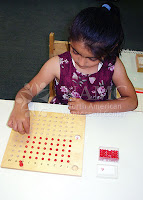 Children show a great attachment to the abstract subjects when they arrive at them through manual activity. They proceed to fields of knowledge hitherto held inaccessible to them, such as grammar and mathematics. I wonder how the theory arose that in order to work with the hand one must have an uncultivated mind, or that a cultivated mind consorted with manual helplessness! Must a man be classified either as a worker with his head or with his hands, instead of being allowed to function with his whole personality? Where is the logic in the view that one-sided development can be beneficial to the whole? ~ Maria Montessori, To Educate the Human Potential
Children show a great attachment to the abstract subjects when they arrive at them through manual activity. They proceed to fields of knowledge hitherto held inaccessible to them, such as grammar and mathematics. I wonder how the theory arose that in order to work with the hand one must have an uncultivated mind, or that a cultivated mind consorted with manual helplessness! Must a man be classified either as a worker with his head or with his hands, instead of being allowed to function with his whole personality? Where is the logic in the view that one-sided development can be beneficial to the whole? ~ Maria Montessori, To Educate the Human PotentialThe following question posed by a NAMC student gives us pause to reflect on the Montessori philosophy that reminds us to follow the child. It highlights an issue that some parents new to the Montessori method raise at the beginning of their child’s elementary educational journey. It also provides Montessori educators with the opportunity to communicate and demonstrate the important philosophy that lies behind the method, and engage Montessori parents in the wondrous experience of their child’s individual development.
Math Tips and Multiplication Issues - Why Montessori Believes in Following the Child
A: Asking first grade students to memorize multiplication tables is developmentally inappropriate. Your Montessori students are doing exactly what they should and that is practicing math operations using the Montessori learning materials. Memorization of math facts takes time. The concept of multiplication must be understood and internalized using the Montessori materials. The Montessori math curriculum is designed so that the child is truly learning and owning each concept completely, which is different from memorizing. Memorization leads to forgetting as it utilizes only short term memory. True learning is established as long term memory.I have worked with fourth grade Montessori students who did not have math facts memorized, yet understood the concept of mathematics and performed even complicated multi-digit multiplication and division operations successfully. The beauty of the Montessori math materials is that they do not rely on the memorization of math facts before a child can experience success. That would be like telling a child he can’t be read to until he can read independently. Eventually, all students will learn the math facts. But this is accomplished on the child’s unique timetable, not that of the parents or the teacher.
The NAMC Lower Elementary manuals are rich with activities that span the entire three-year curriculum.


As much as possible, NAMC’s web blog reflects the Montessori curriculum as provided in its teacher training programs. We realize and respect that Montessori schools are unique and may vary their schedules and offerings in accordance with the needs of their individual communities. We hope that our readers will find our articles useful and inspiring as a contribution to the global Montessori community.
© North American Montessori Center - originally posted in its entirety at Montessori Teacher Training on Tuesday, January 10, 2012.
© North American Montessori Center - originally posted in its entirety at Montessori Teacher Training on Tuesday, January 10, 2012.

0 comments:
Post a Comment
Have questions or comments? Let us know what you thought about this article!
We appreciate feedback and love to discuss with our readers further.